You can hear the unique pulse of the country listening to local radio.
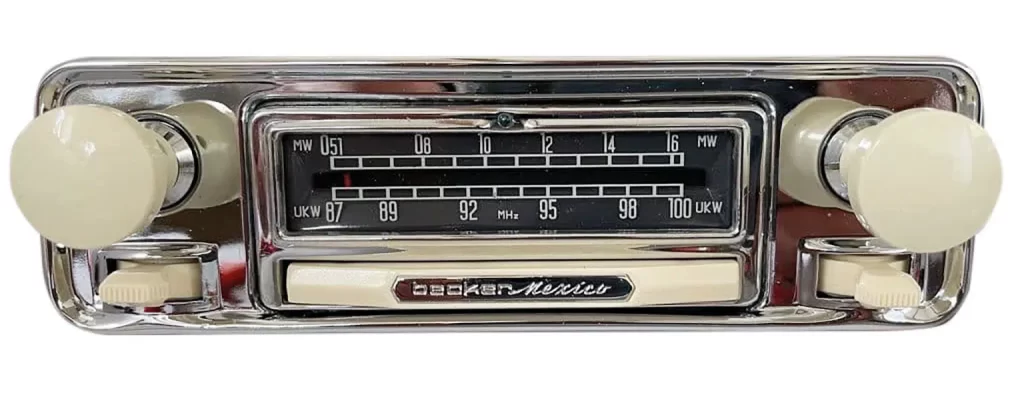
People keep asking me how I intend to listen to America in my travels over the next few years. I’m taking my cues from previous road warriors — Kerouac, Henry Miller, William Least Heat Moon, and especially John Steinbeck. Roadside diners seem to be one of the best places to meet and listen, especially in the morning, when small groups of local folks tend to gather over coffee to discuss the “world situation.” Steinbeck said breakfasts are the one meal you can always rely on in America — hard to screw up eggs, bacon, and toast. I’ll also spend plenty of time in pubs, coffee houses, churches, and of course campgrounds, where you are almost certain to meet and greet your fellow guests. I’m hoping my Airstream, with its Listening to America decal, will prompt some questions.
Over a lifetime of travel, I have learned that one of the best ways to examine the pulse of America is to listen to local broadcasting. Unfortunately, the golden era of local broadcasting is now a phenomenon we cherish in retrospect. The radio dial is less interesting now that local voices and vocal control have yielded to the appalling corporatization of so much in America, from coffee to office supplies to hardware to Applebee’s, Chili’s, and TGI Friday’s. I’d infinitely rather my top-40 hits were served up by an imperfect local DJ who interspersed the songs with tidbits about the weather, the big game coming Saturday night against the Trinity Titans, or his former girlfriend, than hear some slick pre-packaged tasteless and odorless programming distributed internationally by some LA media conglomerate.
The vice principal of my high school in western North Dakota retired early. He bought an 18-wheel truck and began driving freight around the Great Plains. He told me that he was so tired of being over-stimulated, and so eager to go quiet for a change — to let his soul calm down, he said — that he had the radio removed from the truck cab so that he would not be tempted to just listen to whatever was available to pass the time. He said he wanted time to think — to think about his career, to think about America, to think about books, to think about the landscapes through which he drove, and to think about Life.
I won’t follow that example slavishly, but I do intend to spend most of every driving day just musing and gazing out at the magnificence of America. My plan is to listen no more than an hour or two per day to AM (not FM or satellite) radio. And to listen to local rather than national programming. It’s on AM where you hear hog prices and the daily crop report, the Book Notes from Marcie the local Carnegie Library director; the Swap Meet where someone offers for sale a spare lawn mower or a set of snow tires and someone else seeks to purchase a used Barcalounger, call only between noon and six p.m., please. Seven fresh kittens, four of them free to good homes.
I loved listening to after-dark AM programming when the car radios still required vacuum tubes and the signal would wax and wane and voices would drift up into a stratospheric falsetto and then down again to baritone, and it seemed as if random cosmic white noise found its way into the signal.
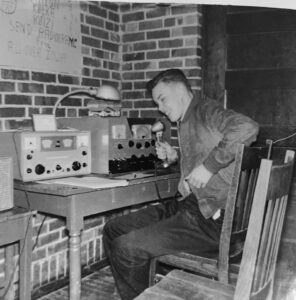
I have satellite radio service in my pickup, and of course I will listen some to my favorite talk shows and my favorite music during my travels, but I want to limit it. The fidelity of satellite radio is too great. The sound is so clear, pure, and unbroken that you forget you are receiving a signal from a metal pod poised 22,000 miles above the earth. It doesn’t feel like radio. It feels more like high resolution television in the car without the picture. I like to be made aware by drift and skip that I am the recipient of electromagnetic waves that emanate from somewhere far away and yet somehow find the antenna of my vehicle. In fact, if I were in charge of the universe, we’d still have radio dials you can turn to fine tune the signal. Digitization of sound and radio has diminished its romance. The digital revolution has also eliminated most of the joy of ham (amateur) radio. When I was 16, with an Advanced Class FCC license, I built a ham SB102 transceiver from a HealthKit kit. When I would tap out a few sentences in Morse code and get a response from someone in Romania or south Texas, it felt like a techno-miracle.
I love the fact that AM radio sounds like radio. The signal waxes and wanes. There is drift. Everything changes at dusk when atmospheric skip suddenly lets you listen to WSM in Nashville or KFI Los Angeles or WGN Chicago. When I was an early adolescent I used to try to listen to the Grand Ole Opry on Saturday evenings, not because I liked the Grand Ole Opry much, but as something faraway and foreign to my childhood in a cattle town on the northern Great Plains. My friend Philip Howard turned me on to Beale Street Blues on WUMB Memphis.
American Voices
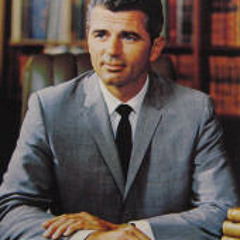
When I was a boy my father controlled the AM dial, of course. Although he was an atheist, he turned me on to a program called The World Tomorrow with Garner Ted Armstrong, a Texas evangelical radio preacher who had an eccentric interest in aviation and particularly international air shows. A ponderous voice came on at the top of the hour and said, “And now, The World Tomorrow with Garner Ted Armstrong, from Tyler Texas, and now, Garner Ted Armstrong.” Armstrong was a likeable radio personality though his favorite book of the Bible seemed to be Revelation. He served up the Seventh Seal with a kind of glee and reminded us that God will not be gentle with the lukewarm.
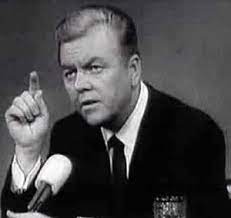
And though my father was a McGovern liberal, he loved to listen to the Joe Pyne Show. Pyne was an aggressive, opinionated, and confrontational syndicated talk show host who denounced hippies, homosexuals, feminists, and many others. Though his views were mostly conservative, his genius was for ridiculing callers and heaping scorn on the men and women he interviewed. The careers of such radio luminaries as Rush Limbaugh, Michael Savage, G. Gordon Liddy, and Sean Hannity were made possible by the pioneering work of Joe Pyne. He was the first exemplar of Hate Radio in my childhood.
I was fortunate to grow up along the Canadian border, for their radio programming was (inevitably) better than ours. My friend Mike J. and I used to listen on CBC Regina to a BBC program called Just a Minute, in which British radio celebrities would have to talk about a random subject for an entire minute without repeating words, stalling, or stammering, or veering from the subject matter. We played the game ourselves on our travels in his modest pickup, not with great success.
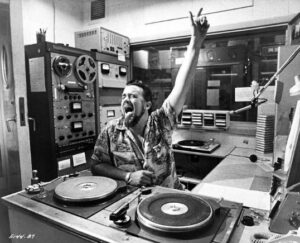
I was driving Dakota with my late mother doing a low-end documentary on cowboys and ranchers when Elvis Presley died on August 16, 1977. The Canadian Broadcast Corporation (CBC) pair of announcers cold called the legendary Wolfman Jack for his reaction. He had not heard the news. When they told him that the King was dead, the Wolfman wept on national Canadian radio. “Man, I can’t talk about this right now,” he said, and hung up. For the rest of the day CBC played Elvis’ gospel music — in my view, some of the best music he ever made. It was one of the signature days of our lives, my mother and I, and it could not have been so significant, so moving, without car radio and the CBC.
I love to listen to radio evangelists of all sorts in all regions of America. The more they get down and chew the carpet the better. We are sinners all. Give me brimstone not spiritual assurances. I’m truly fascinated by the sophisticated textual exegesis many of these radio pastors employ. They know their Bibles and they know how to thump them. Driving through Utah back then I sometimes heard hourlong defenses of LDS orthodoxies, and bizarrely — a program called Jews for Jesus.
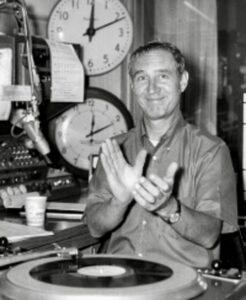
In my own extensive solo journeys across the American West, I often listened to night programming on KSL, a 50,000 watt “blowtorch” station in Salt Lake City. My favorite program late at night in the middle of nowhere was something called Nightcap, moderated by a gentle host named Herb Jepko. Nightcap was the great lonely-hearts club of America. Widows, shut-ins, orphans, disabled men and women, the lonely and the desperate, called in to KSL to have their three or four minutes with Jepko, who invariably remembered Mabel of Provo or Martha June of St. George from week to week and inquired gently about their health and their family troubles. Mostly Jepko just provided a safe space for a wide range of people who really needed someone somewhere to listen to them. He prompted them with careful and sympathetic questions. Everyone who joined him on the air knew there was a strict time limit per call. As Mildred of Elko, Nevada, droned on about her washing machine or her arthritis or her stepson, the sound of tinkling music would start to come up, and Herb would say, “Well, Millie, that’s Tinker Bell and you know we’ll have to say goodbye for now. Let’s talk again soon, shall we?” It made me ache for the vast loneliness of America.
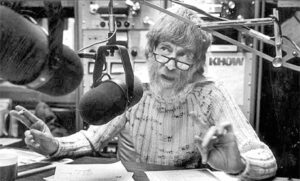
Much later, in my 1980s travels, I listened avidly to the Alan Berg Show on KOA Denver (850 on your AM dial). Berg was an outspoken Jewish liberal atheist and an often abrasive on-air interviewer. He enjoyed riling up conservative and evangelical callers and he often abused his callers with such brainy irony that they did not know just how they had been dissed. He had a good sense of humor, and he was almost invariably entertaining. One show, about a murder investigation that was solved by a parrot “spilling the beans,” became a kind of AM cult classic. Berg was assassinated outside his Denver home on June 18, 1984, by a right-wing white supremacist group known as the Order.
There are times when you need the new age conspiracies and prophecies of Coast to Coast with Art Bell (and its successors) or the Phil Hendrie Show (appallingly politically incorrect and often totally hilarious) just to get another 250 miles down the road on a dark and stormy night somewhere in the American West. When you are dog tired at 2 a.m. far from anything that is lit by neon, almost any talk radio is a lifesaver.
Most of that has been swept away now with the corporatization and consolidation of the airwaves, which carry a handful of national sports talk shows and a wearying standard menu of right wing talk shows. Today if you are surfing the AM spectrum anywhere in America, you are likely to hear only nationally syndicated programming: Sean Hannity, Glenn Beck, or sports talk. At the height of his success, the late Rush Limbaugh’s talk show could be heard on 650 stations nationwide. The liberals have never found a radio answer to Rush.
What Do You Learn This Way?
If you want to understand America you have to come to terms with the breathtaking variety of perspectives, points of view, outlooks, religious systems and sensibilities, local, state, and national political opinions, music genres, local commerce and culture, sports obsession, conspiracy theories, historical revisionism, regional accents, and portals to salvation from crystals to Tarot — and all of this is daily teed up for you on car radio.
You learn how little national and international affairs seem to matter to most Americans. You learn how much the American people need to talk — in the empyrean, to complete strangers, after being on hold for half an hour, and about surprisingly intimate things. You learn that the widespread lack of Harvard Square sophistication is one of the most admirable characteristics of the American people.
You learn that there will be free hotdogs and donuts at the I-H Farm Implement dealership on the edge of town all afternoon. You learn about the missing girl who wandered out of town Thursday night and has not been seen since. You learn about the pancake and sausage benefit breakfast for the Kostelecky kid who has been diagnosed with brain cancer. You learn that high school standout Ty Parker has received a rodeo scholarship at the nearby state college. You learn that God wants you to be wealthy. You learn that God is deciding whether to wipe out humanity for human sexual deviance. You learn that God is dead. You learn that God is a space alien. You learn that by sending in a small monetary contribution you can received authenticated water from the River Jordan. You learn that the annual Rotary dinner has been canceled because the state director has come down with the flu. You learn that there have never been better bargains for used GMC pickups at Granger Chevrolet. You learn that your Covid vaccine contains a small chip through which you will be surveilled by Big Pharma. You learn that the world economy is being manipulated by the Trilateral Commission and One World Government. You learn that there will be free swimming lessons all next week at Liberty Pool. You learn that three copies of the latest Harry Potter book are now on the shelves of the Pike City Library, open 2-4:30 p.m. every Thursday afternoon.
Books on Tape
I’ve been listening to books on tape for decades, ever since you received in the mail a box of 24 brown cassettes embodying the complete Moby Dick. After a range of technological iterations — CDs and the Walkman among them — listening to audiobooks has entered a kind of golden age of its own. Some of the greatest audio readers — Grover Gardner, Davina Porter, Simon Vance, Stephen Fry, and Richard Armitage — have turned audiobook reading into an art form. A great reader can bring a book to life in ways that startle as much as they satisfy. A mediocre reader can wreck David Copperfield or Pride and Prejudice.
I plan to do a fair amount of audiobook listening as I travel America, but while I understand the importance of the phenomenon, I always feel a little like I’m cheating when I listen to a book on tape. I’m enough of an old fuddy duddy to believe that books are to be read in silence, preferably in a printed rather than digitized medium. And when audiobooks are read well, they tend to pull my concentration from the landscapes I am traveling to see and study.
Automobile audio is as American as apple pie, yet when car radios were first being introduced in the late 1920s, there was widespread concern that they would distract drivers and drive-up road accidents and fatalities. Massachusetts and St. Louis considered banning them in cars, but listening to the radio in the car proved to be as irresistible as texting while driving is today. I remember when my parents forbade my older sister from turning on the car radio when she was driving. You can imagine how successful their strictures were. She once had six car accidents in a single year; there were no injuries except to my father’s insurance premiums.

My two vehicles both have satellite radio. Generally, when I am out and about running errands, I listen to MSNBC, CNN, POTUS, or FOX for the latest installment of American agonistes. But when I get into the driver’s seat after my daughter has been using the car, I’m immediately bombarded with loud country western music. She’s a doctoral candidate at Oxford University in Great Britain and I cannot decide if her addiction to country western crooners lowers or increases my respect for her. When she gets in after I’ve been driving and hears the unmistakable voices of Jim Acosta or Lawrence O’Donnell, she just rolls her eyes.
I know this much: You cannot listen to America without listening to American radio. What was best about AM radio is now mostly gone, but there is still just enough of quintessential Americana between 535 and 1705 kHz, to make me spend hours pushing the scan button in search of something fascinating in the heart of what Steinbeck called “this monster country.”
